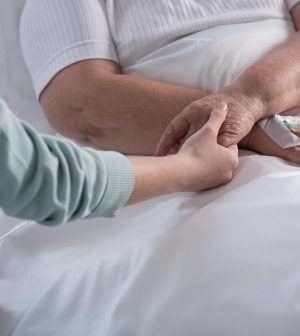- Could Your Grocery Store Meat Be Causing Recurring UTIs?
- Are You Making This Expensive Thermostat Error This Winter?
- Recognizing the Signs of Hypothyroidism
- 10 Strategies to Overcome Insomnia
- Could Artificial Sweeteners Be Aging the Brain Faster?
- Techniques for Soothing Your Nervous System
- Does the Water in Your House Smell Funny? Here’s Why
- Can a Daily Dose of Apple Cider Vinegar Actually Aid Weight Loss?
- 6 Health Beverages That Can Actually Spike Your Blood Sugar
- Treatment Options for Social Anxiety Disorder
Seizures Seem Tied to Faster Decline in People With Dementia

Dementia patients who suffer from seizures tend to decline faster and die younger, according to a new study that urges caregivers to watch for these sudden brain changes.
“Our hope is that controlling seizures by prescribing antiseizure medications to these patients will slow down the progression of cognitive impairment,” said Dr. Ifrah Zawar, lead study author and an assistant professor at the University of Virginia School of Medicine.
“Unfortunately, seizures are often underdiagnosed because they can be subtle and the person just seems confused, so family members often mistake them for typical signs of dementia,” Zawar added in a news release from the American Epilepsy Society.
In some people, a staring spell is evidence of a seizure, while others may experience uncontrolled jerking movement of their arms or legs.
Researchers analyzed data from 2005 to 2021 from 39 Alzheimer’s disease research centers, determining that 374 (1.4%) of the more than 26,000 dementia patients had seizures.
Those patients were significantly younger when mental decline began, under 63 years old compared to 68 years old. They also died younger, at just under 73 years old compared to nearly 80 years old.
The dementia patients who had seizures were more likely to have a genetic mutation related to Alzheimer’s disease, to have suffered a stroke or traumatic brain injury, to have depression, or to have less education, the researchers found.
Dementia patients with seizures had more advanced cognitive impairment, including problems with thinking, communication, understanding and memory. They also had more difficulty with basic daily activities, including eating, bathing, dressing and using the bathroom.
Investigators also found they were more likely to be dependent on others for physical help.
“We know dementia patients are more likely to have seizures, and that people who have seizures are more likely to develop dementia, but it’s still a ‘chicken and egg question’ regarding which one causes the other,” Zawar said.
“It’s important for family members and health care providers to recognize the patients with dementia who are at high risk for developing seizures, and ensure they are diagnosed and treated in a timely fashion,” she advised.
Seizures occur in as many as 64% of people who have dementia, the researchers said in background notes, and those with dementia are six to 10 times more likely to develop seizures.
The findings were scheduled for presentation Friday at the American Epilepsy Society annual meeting, in Nashville. Findings presented at medical meetings are considered preliminary until published in a peer-reviewed journal.
More information
The U.S. Centers for Disease Control and Prevention has more on dementia.
SOURCE: American Epilepsy Society, news release, Dec. 2, 2022
Source: HealthDay
Copyright © 2026 HealthDay. All rights reserved.










